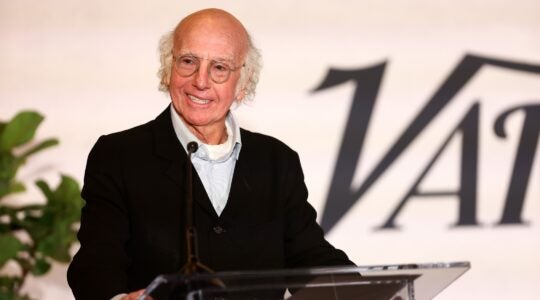Michael Steele, the new Republican National Committee chairman, had generally good relations with the Maryland Jewish community during his four years as lieutenant governor from 2003-2007. He led a trade mission to Israel in 2005 and told the Washington Jewish Week back then that his state and the Jewish state had so much in common, they were like sisters:
From their similar population, to their mix of "traditional and avant-garde communities" to their "technologically based … intelligent" work forces, they are "so compatible in so many ways," Michael Steele said in a telephone interview from Israel on Tuesday.
He also spoke about what his visit meant to him personally:
For Steele, though, the trip was much more than a business mission.
"To walk the streets of Jerusalem, to stand at the [Western] Wall, for me it’s an affirmation of faith," said the lieutenant governor, adding that he was able to see the "genesis of my Catholic faith" in Israel and how it was linked with Judaism. The trip’s high point, he said, was his visit to the Yad Vashem Holocaust museum."Everyone who comes to this country needs to go there," he said, recounting in particular the time he spent in the children’s memorial, with its candlelit tribute to the 1.5 million young lives "cut short" by the Nazis.
As an African American, he said the memorial had a particular poignancy. "My people [and the Jewish] people are tied together" in being persecuted "just because of who you are," Steele said.
During Steele’s unsuccessful bid for the U.S. Senate — he lost to Ben Cardin — the charismatic candidate did have one stumble with the Jewish community. It came in a February 2006 meeting with the Baltimore Jewish Council, when he compared stem-cell research to Nazi experimentation during the Holocaust. As the Washington Post wrote:
In an appearance Thursday before the Baltimore Jewish Council, Steele responded to a question about stem cell research by saying he was "cautious" about the idea of "tinkering around with life," and added:
"Look, you of all folks know what happens when people decide they want to experiment on human beings, when they want to take your life and use it as a tool," Steele said, according to a recording of the event. "I know that as well from my community and our experience with slavery."
Steele quickly apologized to Jewish leaders and the wider community for the remarks:
"I offended members of the Jewish community and members of the Maryland community," Steele said outside a Prince George’s nursing home. "It was a remark that was an improper inference, because I never specifically said Holocaust. . . . And it did not reflect my attitude and my belief, and I am really sorry about the whole thing."
UPDATE: Ira Forman, at the Huffington Post, reminds us of another incident from the past involving Steele and Jews: He took a couple weeks to condemn an anti-Semitic flyer that was distributed by one of his supporters right before the 2006 election. (Steele had nothing to do with the flyer). Here’s the Washington Jewish Week:
"I was not involved in nor did I authorize the creation or dissemination of this material nor had any knowledge of its existence until reported by the media," Steele writes in a letter to Jewish Community Relations Council of Greater Washington executive director Ron Halber dated Nov. 22, more than two weeks after Election Day.
"The content of this flyer in no way represents by [sic] beliefs or opinions," he continues, adding that he stands in opposition to the flier’s "intolerance and insensitivity."
The flier, titled "Ben Cardin Exposed!" stated that "Ben Cardin Promises to attack Jesus Christ, Pastors, Churches and Christians and to Take Away Blacks’ Freedom If He Is Elected." It also lists some issues, including same sex marriage and abortion, and states that Steele is "for what Jesus says" and Cardin is "against what Jesus says."
Halber was pleased that that the lieutenant governor had formally denounced the campaign literature, but did note the length of time that had elapsed since the election.
"We do wish the response would have been more timely," said Halber, but "better late than never."
JTA has documented Jewish history in real-time for over a century. Keep our journalism strong by joining us in supporting independent, award-winning reporting.





